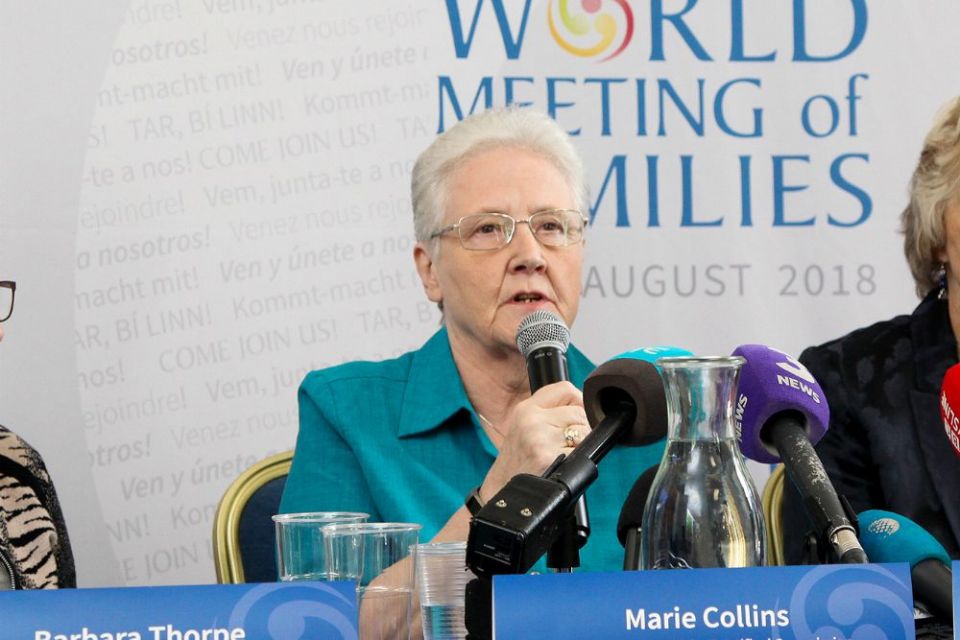
Irish abuse survivor and advocate Marie Collins, addressing the World Meeting of Families in August 2018
In an exclusive statement to the US National Catholic Reporter, Ireland’s Marie Collins has asked for a meeting with Pope Francis to clarify the process whereby Catholic bishops are judged for their adherence to rules governing the disciplining of priests accused of child sexual abuse.
Collins’s request arises out of reports that on the return plane journey to Rome from Ireland on August 26th, Pope Francis had said that she appeared ‘fixated’ on the necessity for a central Vatican tribunal to judge bishops alleged to be covering up cases of clerical child sex abuse.
“I have no problem in admitting to being determined to see those who protect perpetrators held accountable (though “fixated” is not how I would describe myself!),” Collins declares in her statement to NCR. “The priest who abused me was exposed as a perpetrator to his bishop soon afterwards, but the bishop did nothing, and the priest went on to sexually assault little girls in his parishes for the next 30 years — hence my determination that perpetrators not be protected.”
Taking up the pope’s reported offer to explain to her the church process now supposedly in place next time she is in Rome, Marie reveals that she will be in Rome September 9-14 and would be glad of a meeting with the pope – to ‘understand better’ several questions that puzzle her.
These include:
- What was it that changed the pope’s mind on the need for a central Vatican tribunal to judge all reported cases of the failure of a bishop to report allegations of clerical abuse – since his reported support of that proposal in June 2015?
- If the process now in place involves ‘local’ courts, and some bishops have been judged in these, have all been found innocent of cover-up? If not, why have cases of guilt not been made public?
- How could such local courts ensure that there could be a single standard of conduct across the universal church, free of the possibility of local non-compliance with international law?
- If these courts are already in operation, why did the pope refer in his letter of August 20th to delays in applying the “actions and sanctions that are so necessary”?
To read Marie Collins’s full statement to NCR, click here.



Marie Collins is to be applauded for her persistance in pursuing this issue and for seeking total clarity and transparency on how bishops and those in higher offices are to be investigated when the suspicion or allegation of cover-up is involved. She favours the centralised approach with a single Accountability Tribunal based in Rome. It would appear that Francis favours regional or local tribunals. This latter would be in keeping with his belief that decentralisation from Rome with more local autonomy is the way forward in the Church – that the one-fits-all approach of the past dictated by the Vatican Curia has failed and that more decision making should take place locally.
I think it important that we hear arguments for and against both scenarios. Is it better to take evidence and hear witnesses in, say Boston (if it is an American Church case), or should all witnesses be summoned to Rome for a hearing? To my mind, the most important aspect of any tribunal should be the expertise and independence of the members. The location should be where the witnesses, and particularly the abused, are most comfortable and the language should be that spoken in the territory where the offences are alleged to have taken place. Marie Collins has had the advantage, no doubt, of having these issues and options argued in the course of the Pontifical Commission for the Protection of Minors and it would be useful if she would expand on the pros and cons of the two so that the rest of us would be better informed in making our own judgements on Francis’s approach.
Desgilroy41, point well made. I agree totally with Marie Collins’ point about ‘total clarity and transparency’ but would suggest that local tribunals may be best as the travel, meals, accommodation and missed employment costs for lay witnesses may deter them from travelling to Rome, unless all reasonable travel etc expenses are to be met by the Vatican. However, as you suggest, it is best if the arguments for both sides are put clearly before Pope Francis makes a final decision.
Aidan